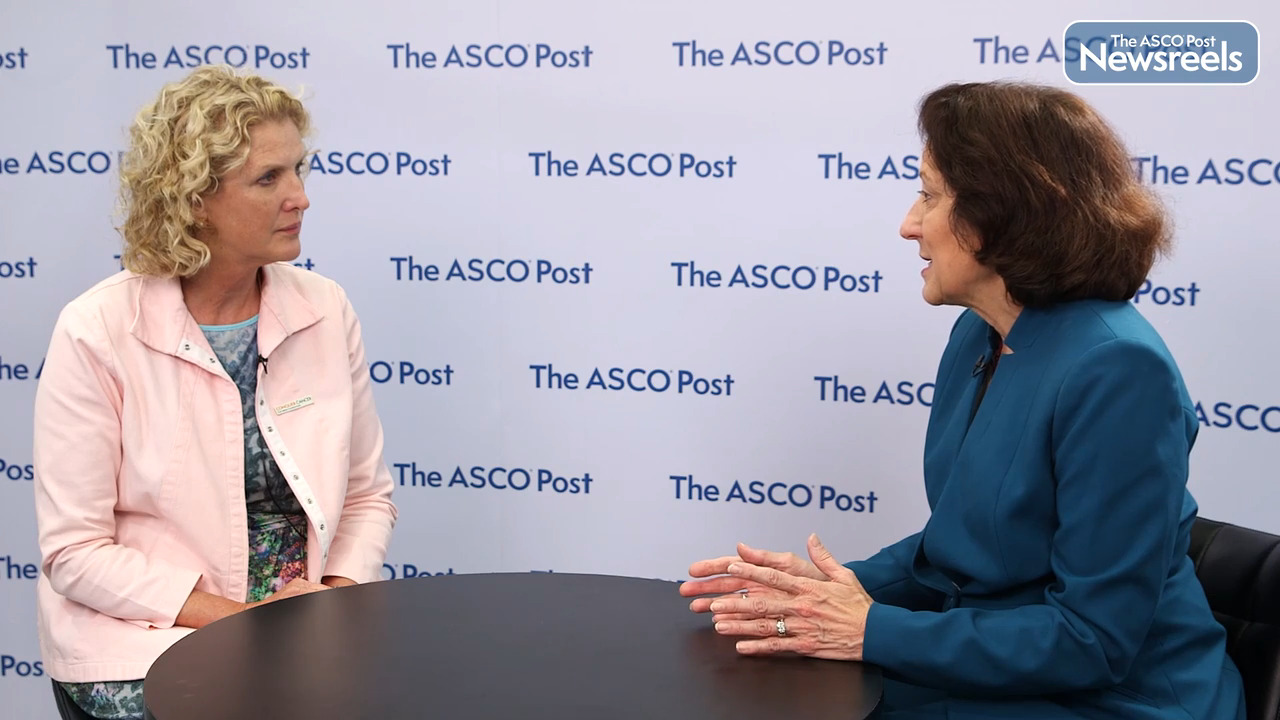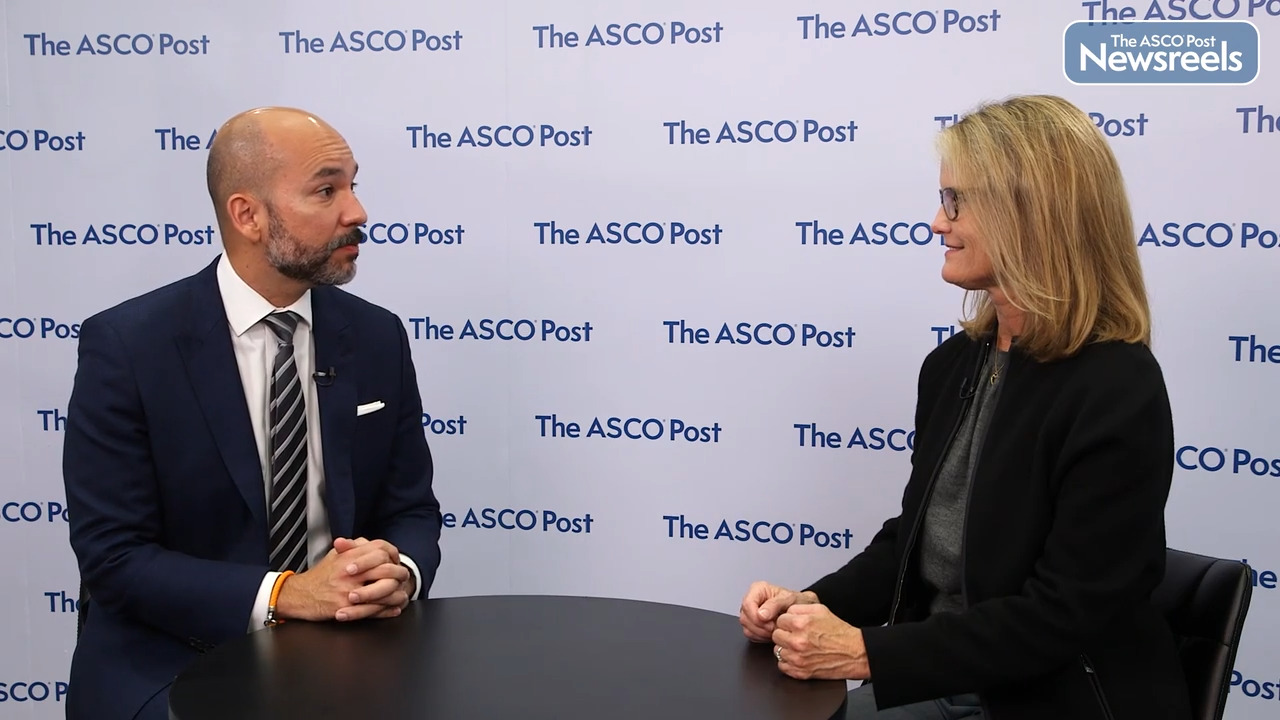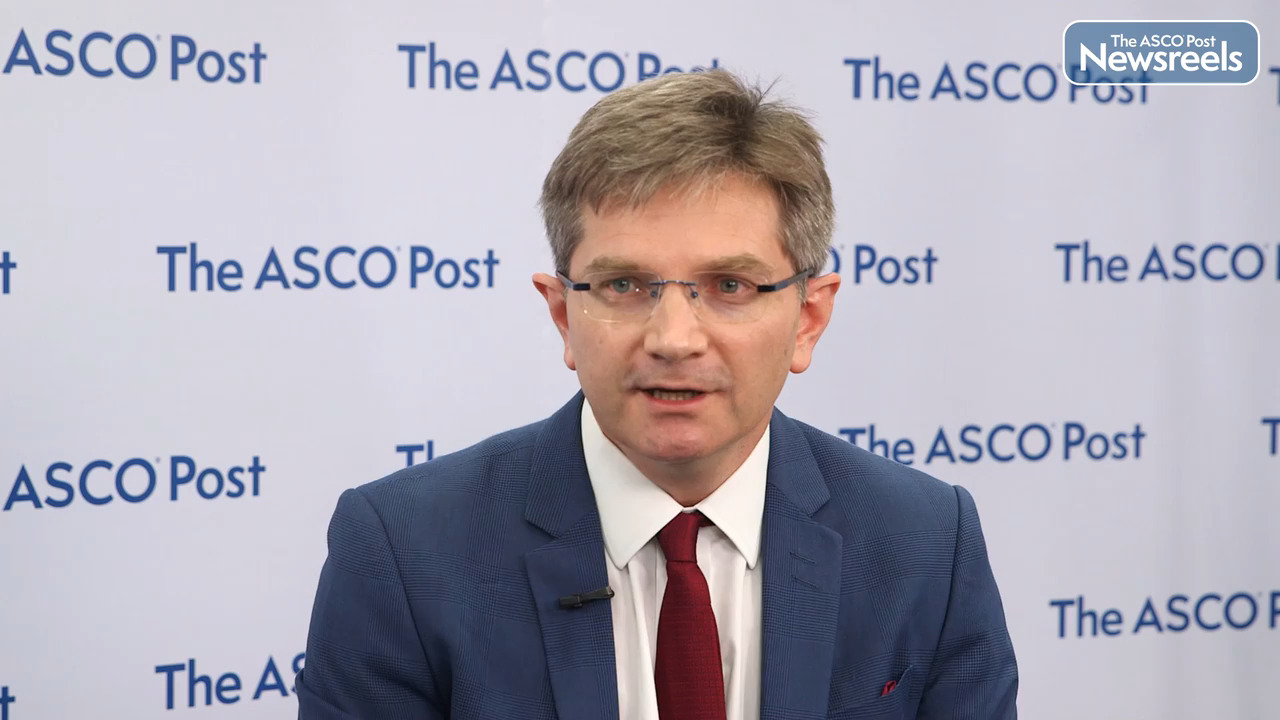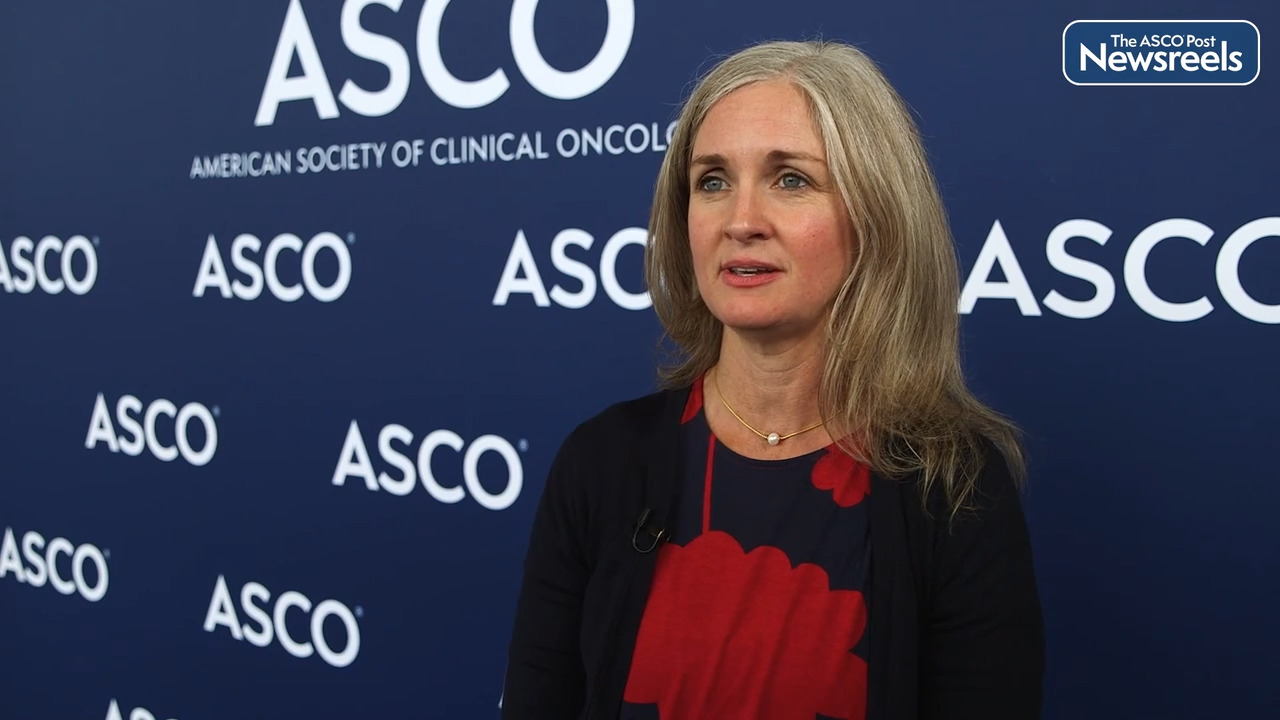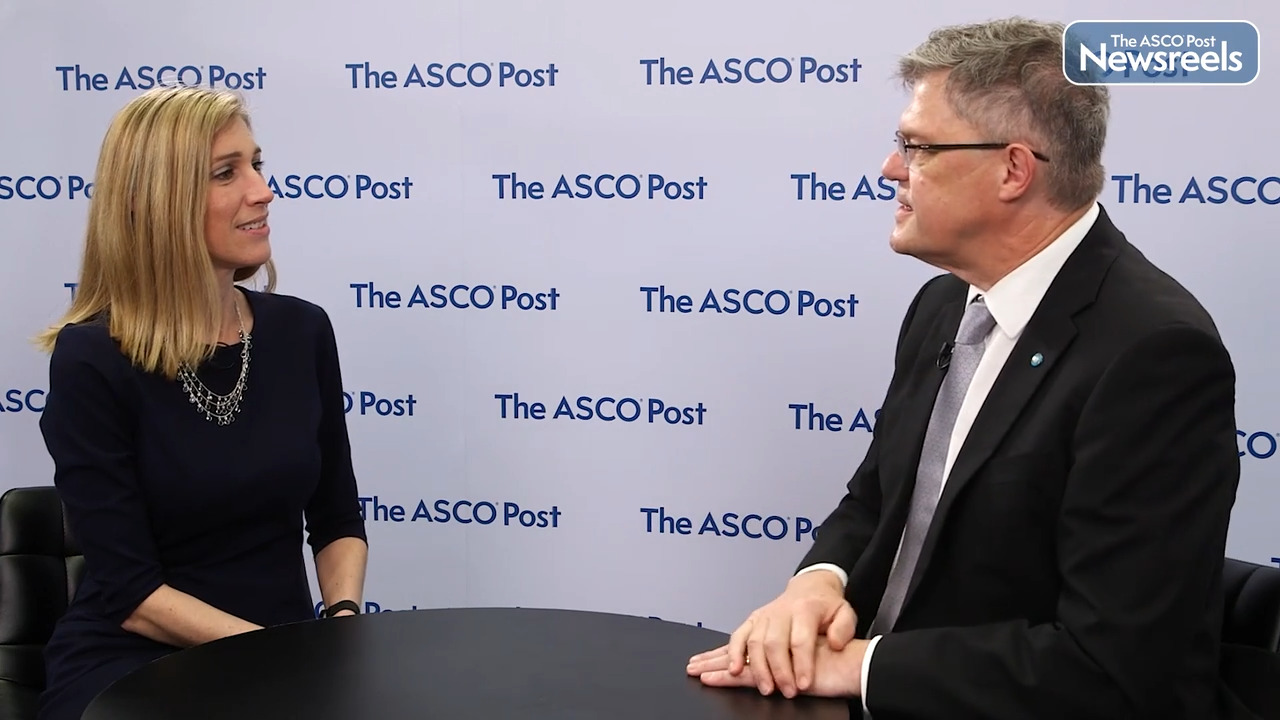Robert Hugh Jones, MD, PhD, on Breast Cancer: Updated Overall Survival Data on Fulvestrant Plus Capivasertib
2022 ASCO Annual Meeting
Robert Hugh Jones, MD, PhD, of Cardiff University and Velindre Hospital, discusses results from an updated analysis of the FAKTION trial, which showed improved overall survival with fulvestrant plus capivasertib in women with metastatic estrogen receptor–positive breast cancer whose disease had relapsed or progressed on an aromatase inhibitor. The benefit may be predominantly in patients with PIK3CA/AKT1/PTEN pathway–altered tumors, a topic researchers continue to study in the phase III CAPItello-291 trial (Abstract 1005).
Transcript
Disclaimer: This video transcript has not been proofread or edited and may contain errors.
So the FAKTION trial is a randomized phase two trial that compares the activity of a hormone therapy called Fulvestrant plus capivasertib, which is an AKT inhibitor, compared to Fulvestrant and placebo in patients with oestrogen-receptor-positive, HER2-negative breast cancer, which is incurable. So patients with metastatic disease. and what we did in the first instance is we randomized patients one to one to get either Fulvestrant plus capivasertib or Fulvestrant plus placebo. And in the first instance, we looked at progression-free survival in the intention to treat population. This was reported around three years ago, and it showed that patients who got the capivasertib had a survival or progression-free survival of around about 10.3 months compared to 4.8 months, if you got the Fulvestrant plus placebo. At that time, we did some limited biomarker analysis to see were the patients who had an activated pathway with PI3-kinase mutations were more likely to get benefit from those than those patients that didn't have an activated pathway. At that time, there was no difference between the two groups. So the advantage you couldn't distinguish which patient groups were going to get the most advantage. What we've now done is we've waited some time and done further analysis. So what we are looking at now is overall survival and looking at a more extensive biomarker analysis. And what we found most importantly was patients not only experienced longer time to control their cancer in the capivasertib group, but they had a longer overall survival. So within unselected patient groups that was around about six months, it was 29 months compared with 23 months. But when we did the biomarker analysis, we identified a greater number of patients that had what we call an altered pathway. So around about 54% of patients had an altered pathway. And when we looked at those patients, they were the ones that got the most benefit. So in terms of overall survival, patients with an activated pathway had around about 39 months worth of life. Whereas patients who had an activated pathway, but got placebo only had around 20 months when we looked at the patients that didn't have an activated pathway, there was very little difference between the two groups. So there was no particular benefit in getting the extra capivasertib drug. And what that means is that we can now select patients out who are most likely to benefit from this new treatment. It is a phase two study. So on its own, it won't change practice, but we have right behind it, a phase three study called CAPItello, and that will be looking at a much larger group of patients. And what we can then see is whether this large group of patients get a similar benefit. The other thing to mention is that because FAKTION was recruiting a number of years ago, patients weren't getting CDK4/6 inhibitors before entry into the study standard practice has now changed. And therefore the phase three study that's following on will look at that group of patients that are getting CDK4/6 inhibitors. And therefore it'll be more representative of real life data. We hope the phase three study repeats the incremental benefits that we've seen in the phase two. And that in turn could lead to a change in practice.
Related Videos
Lisa A. Carey, MD, of the University of North Carolina Lineberger Comprehensive Cancer Center, and Hope S. Rugo, MD, of the University of California, San Francisco, Helen Diller Family Comprehensive Cancer Center, discuss phase III results from the TROPiCS-02 trial. This study showed that sacituzumab govitecan-hziy was more beneficial than single-agent chemotherapy in terms of progression-free survival in heavily pretreated patients with hormone receptor–positive/HER2-negative and unresectable advanced breast cancer (LBA1001).
The ASCO Post Staff
Gilberto de Lima Lopes, Jr, MD, MBA, of the Sylvester Comprehensive Cancer Center at the University of Miami, and Karen L. Reckamp, MD, of Cedars-Sinai Medical Center, discuss phase II findings from substudy S1800A of the Lung-MAP protocol. The data showed that ramucirumab and pembrolizumab improved overall survival compared with the standard of care for patients with advanced non–small cell lung cancer who were previously treated with immunotherapy and platinum-based chemotherapy (Abstract 9004).
The ASCO Post Staff
Benoit You, MD, PhD, of Lyon University hospital (HCL, France) and GINECO group (France), discusses findings from the GOG-0218 trial of patients with ovarian cancer, which appears to confirm earlier data on the link between poor tumor chemosensitivity and benefit from concurrent plus maintenance bevacizumab. In Dr. You’s validation study, patients who derived the most progression-free and overall survival benefit from bevacizumab were those with high-risk disease (stage IV or incompletely resected stage III) associated with an unfavorable KELIM score (CA-125 kinetic elimination rate constant, calculable online) (Abstract 5553).
The ASCO Post Staff
Tara B. Sanft, MD, of Yale University, discusses the results of the LEANer study (Lifestyle, Exercise, and Nutrition Early After Diagnosis) in women with breast cancer. It showed that patients with newly diagnosed disease who were just starting chemotherapy could improve physical activity and diet quality. While both groups had high rates of treatment completion, women in the intervention who exercised at or above the recommended levels did better in terms of treatment completion, with fewer dose reductions and delays (Abstract 12007).
The ASCO Post Staff
Alicia K. Morgans, MD, MPH, of Dana-Farber Cancer Institute, and Ian D. Davis, PhD, MBBS, of Monash University and Eastern Health, discuss the latest findings from ANZUP Cancer Trials Group’s ENZAMET cooperative group trial of enzalutamide in patients with metastatic hormone-sensitive prostate cancer. The results corroborate the benefit of enzalutamide with improved overall survival, and involve some exploratory subgroup analyses (Abstract LBA5004).
